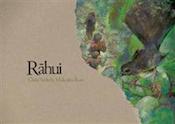
Rahui
Written by Chris Szekely
Illustrated by Malcolm Ross
Wellington, Aotearoa New Zealand: Huia Publishers, 2011, n.p.
ISBN: 978-1869694708
Chris Szekely writes from his childhood memories of summer holidays at the beach. Summer has come and the main character’s family goes to visit relations in the country. They love being able to play in the bush, ride horses, catch eels, but most of all they love to go to the beach. They swim, fish, eat, and play. One day they think his cousin, Thomas, has gone home early because they can’t find him as they swim. Later the father finds him drowned. After the funeral, a rāhui—the Māori word for restriction—is put on the beach and they cannot go to swim or fish or eat or play. “Our hearts weep for Thomas as he joins our ancestors. And we say farewell.” A year later a headstone is unveiled and the restriction is lifted. The friends can all go to the beach again. They are delighted to do so, but as the last words in the book say, “our love remains.”
This is a beautiful and powerful book. The words are straight-forward and direct. The sentences are short. There are no euphemisms. The meaning is clear and open. It is almost a poem in honor of all that life holds—great joy and deep sadness. The end pages are done in brown paper—rough and unfinished. This matches the illustrations, done by Malcolm Ross—oil on brown paper–that also have an unfinished feel. The images are bold and strong and match the directness of the text.
The author is Māori and there are Māori words throughout—but in places where it is clear what the words mean even if you don’t know the language (There is also a glossary at the end that defines all the words, if you want more than context for interpretation.) The illustrator grew up in Māori areas and has authentically used Māori imagery in the illustrations. While set in a specific cultural context, the theme and illustrations are universal.
Chris Szekely is chief librarian at the Alexander Turnbull library of the New Zealand National Library. This was his first book, but he has since written a retelling of a Māori traditional tale. In the 1980s Szekely and Ross were colleagues and started to collaborate on Rāhui. In the intervening years Malcolm died and the project was left unfinished. In 2010 the paintings came into the possession of Duncan Ross, Malcolm’s older brother, who reconnected with Szekely and the publisher to bring the book to fruition (Szekely, C., October 30, 2013, E-mail correspondence with the author).
Rāhui won the 2012 New Zealand Post Children’s Award for Best Picture Book and also 3 awards from LIANZA (Library and Information Association of New Zealand Aotearoa)—the Russell Clark Award, the Librarians’ Choice Award Winner and the Te Kura Pounamu shortlist. The New Zealand Post Children’s Book Award is given at the end of the New Zealand Book Council Festival each May to recognize excellence in writing in four categories: picture books, junior fiction, young adult fiction and non-fiction. The LIANZA Awards are given annually—the Russell Clark award is for the most distinguished children’s text and illustrations.
The book deals simply, directly and beautifully with death and could be used with younger children in tandem with other books that deal with the rituals around a death such as Dead Bird by Margaret Wise Brown (1995). Because of its straight forward style and illustrations, it also would work with an elementary or middle school aged child—partly because of the impact of the theme and partly because the illustrations are not totally representational. For the older child, it would pair nicely with On My Honor by Marian Dane Bauer (2012, reissue) where the child feels some responsibility for the death of a friend while playing and swimming.
The book is published by Huia Publishers in New Zealand and currently does not have a U.S. publisher, though it has been taken to the Bologna Children’s Book Fair according to Frances Plumpton, literary agent in Auckland, New Zealand (Plumpton, F., September 25, 2013. Personal conversation.) This is a huge loss as it is one of the most moving and honest books I have read and certainly would speak directly to children in the U.S. who have had experiences of loss of friends or family through drowning. It was not taken by U.S. publishers because they said it was too culturally tied to the Māori culture. It references Māori rituals, and does so with authenticity and transparency—which is what brings the richness that cuts across cultures. I found it enriching to have it placed in this context. Since it is a fairly new book, my hope is that a publisher may yet choose to bring it to the U.S.—we would all benefit.
Kathy Meyer Reimer, Goshen College, Goshen, Indiana
WOW Review, Volume VI, Issue 2 by Worlds of Words is licensed under a Creative Commons Attribution-NonCommercial-ShareAlike 4.0 International License. Based on work at https://wowlit.org/on-line-publications/review/vi-2/
